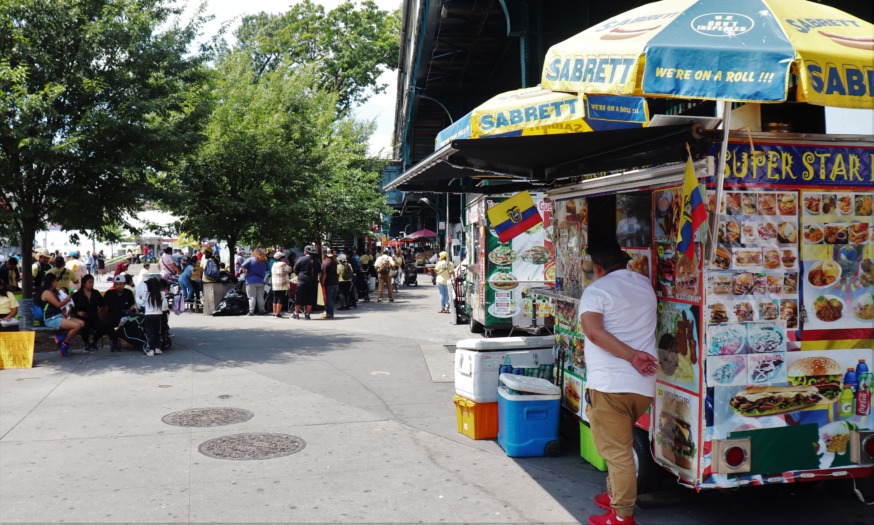
A battle has erupted between unauthorized street vendors, and a cohort of residents and small business owners. An authorized vendor, pictured, looks on as unauthorized vendors who were forced to shut down congregate at Corona Plaza (Photo by Michael Dorgan)
Aug. 14, 2023 By Michael Dorgan
*This article contains several video interviews below*
Corona is one of the most diverse areas in Queens that has gained a reputation for being a food hub offering cuisine from all around the world, but an explosion of unauthorized street vending — and its knock-on effects — appears to be dividing the immigrant-rich neighborhood.
A battle has erupted between the unauthorized vendors who are fighting for permission to sell on the streets and a cohort of residents and small business owners who say the vendors have made the neighborhood dirty and unsafe, and compete with brick-and-mortar establishments who offer the same food and goods while also paying rent, or city and property taxes.
A crackdown on illegal vendors by the Dept. of Sanitation (DSNY) nearly three weeks ago resulted in more than 80 workers being forced to stop vending in a pedestrian plaza called Corona Plaza, which is situated next to the busy 103rd Street-Corona Plaza elevated subway station. The bustling, often chaotic 13,000-square-foot plaza has become a vendor hot spot and ballooned in popularity with the onset of the pandemic as sellers who had lost their jobs due to the COVID-era lockdowns descended on the space to survive the economic downturn.
The unauthorized vendors, many of whom are undocumented immigrants from Mexico and South America, sell food such as tacos, pupusas, grilled meats and elotes, as well as clothing, electronics, and artisanal jewelry under the clamor of 7 trains ringing out overhead.
The crackdown has left the workers without jobs and no source of income, and they are pleading with the city to find a resolution to let them sell. The unauthorized vendors say cart permits are very hard to acquire — as the city had essentially put a cap on permits — and they would get them if given the opportunity. Many of the vendors have mobile food licenses issued by the Dept. of Health but they cannot get a permit to sell from carts.
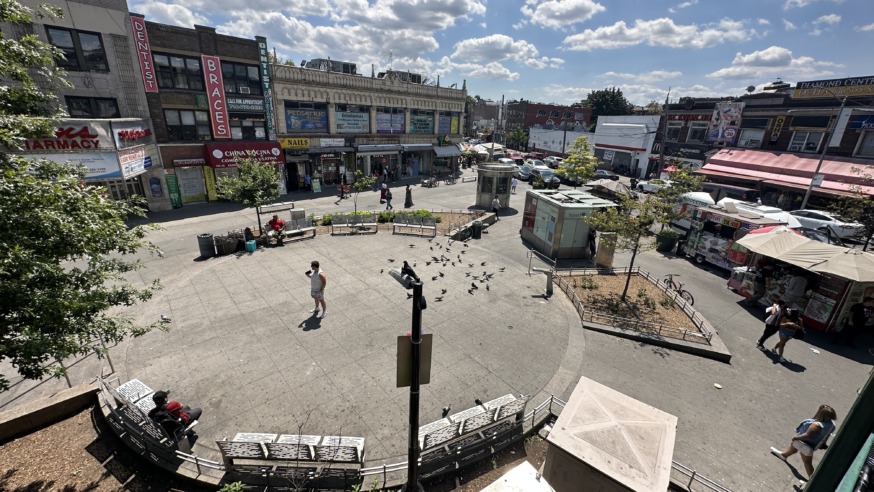
A battle has erupted between unauthorized street vendors and a cohort of residents and small business owners. A photo of the plaza after the crackdown (Photo by Michael Dorgan)
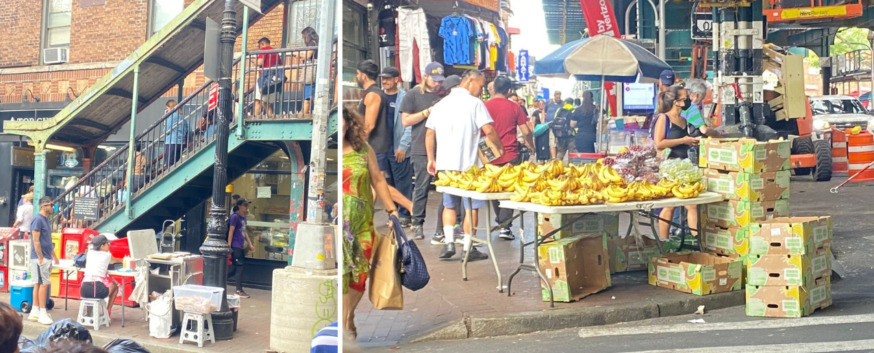
A vendor operating near subway stairs (L) and a vendor stall on a sidewalk (R) (Photos provided)
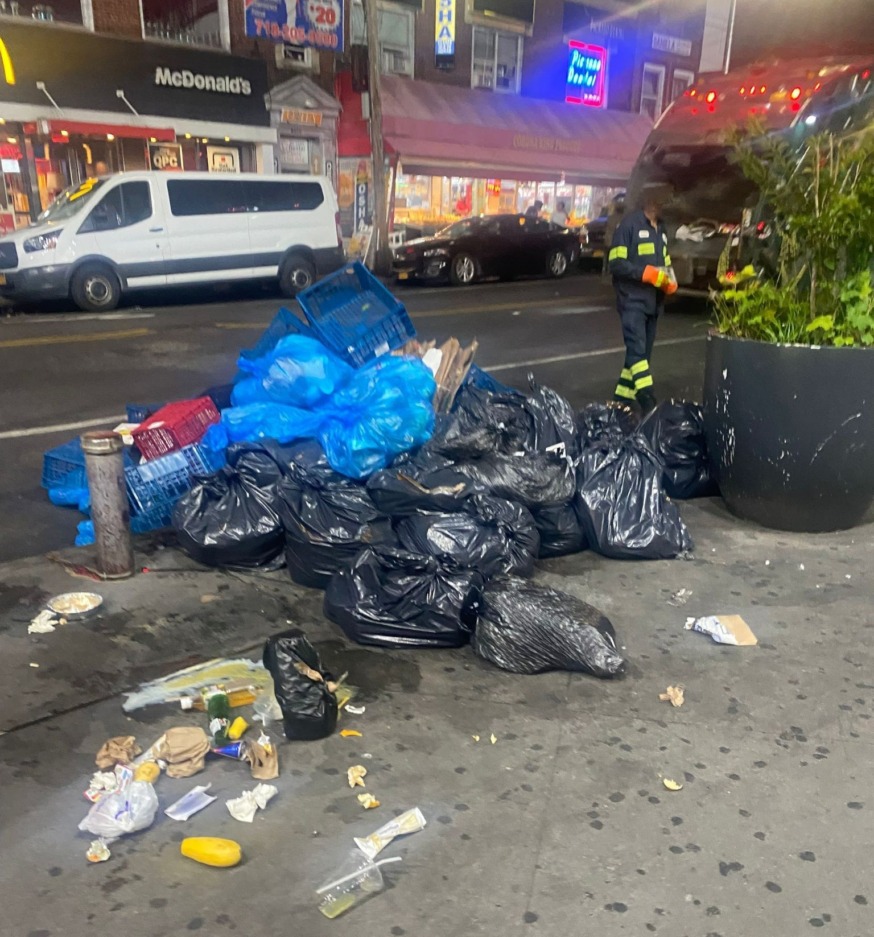
Trash at Corona Plaza (Photo provided)
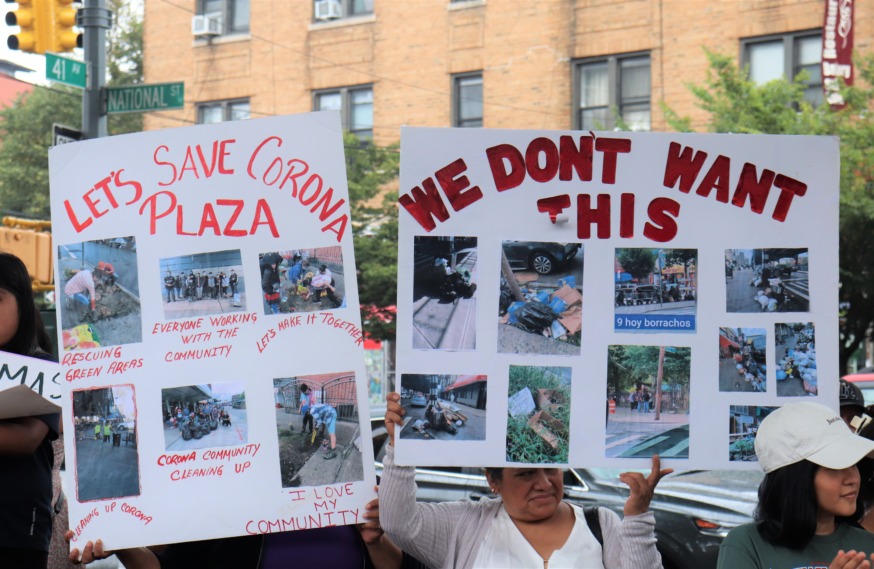
Demonstrators for safe streets and no unauthorized vendors in Corona (Photo by Michael Dorgan)
The unauthorized vendors have found allies in their fight with a non-profit group called the Street Vendor Project of the Urban Justice Center, a nonprofit group that advocates for street vendors, and Democratic elected officials such as U.S. Rep. Alexandria Ocasio-Cortez and Queens Borough President Donovan Richards who held a boisterous rally at the plaza earlier this month condemning the crackdown, while they also called for the city to urgently issue more permits. Assembly members Catalina Cruz and Steve Raga, as well as Council member Julie Won were also present, while Assembly member Jessica-Gonzelez-Roja visited the protesting vendors at the plaza on Thursday, Aug. 11.
The elected officials and the advocates said they were upset about the DSNY enforcement, given many vendors at the plaza had formed their own advocacy group called the Corona Plaza Street Vendors Association and had been working with city agencies as well as the borough president’s office to improve the management of the area.
“It is functionally impossible for these street vendors to comply with the law,” Ocasio-Cortez said to the crowd at the rally. “The answer is to let them grow, not kick them out.”
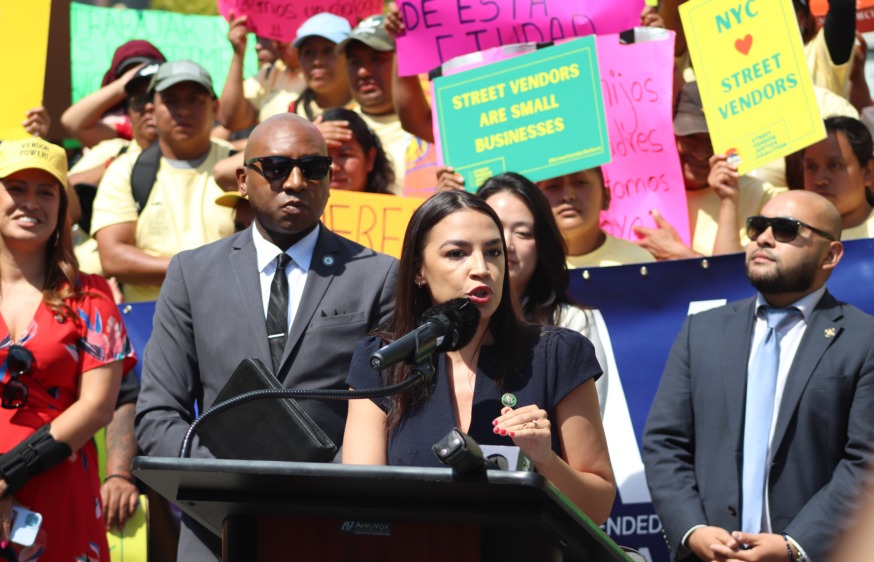
Congresswoman Alexandria Ocasio-Cortez at a rally for unauthorized vendors (Photo by Michael Dorgan)
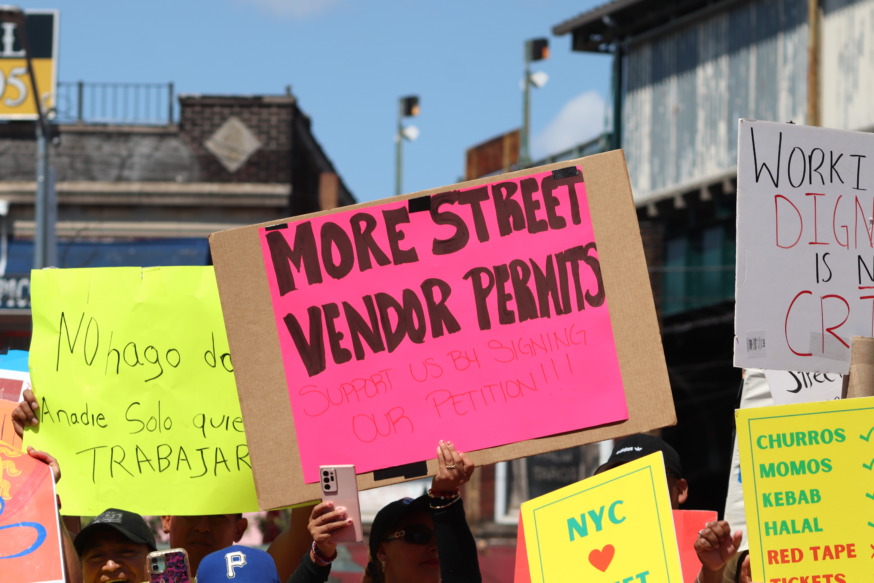
(Photo by Michael Dorgan)
Supporters of the enforcement say the sweep has helped clean up the area and has drastically improved the quality of life for residents, although they say there is more work to be done to improve the neighborhood including curbing homeless people congregating in public spaces to drink alcohol.
They say that the vendors had essentially taken over the plaza, clogged up surrounding sidewalks and created heaps of trash. Photographs obtained by the Queens/Jackson Heights Post shows trash on the sidewalks prior to the DSNY sweep while other images show vendors operating in tight spaces near the steps to the subway station, while vendors were also shown to be operating illegally near pedestrian crossings. The DSNY said its enforcement operation was prompted due to the area having significant issues with cleanliness and pedestrian access.
Feeling that their voice had not been heard, the residents and small business owners held a counter rally on Monday, Aug. 7, saying that the sweep was necessary because conditions at the plaza, and all around the neighborhood, had become dirty and unsanitary due, in large part, to the unauthorized who flout the law and leave trash behind. They sounded the alarm too on concerns over massage parlors operating as illegal brothels in the area.
They said that they empathize with the unauthorized vendors’ need to earn a living but that what has been going on is unacceptable.
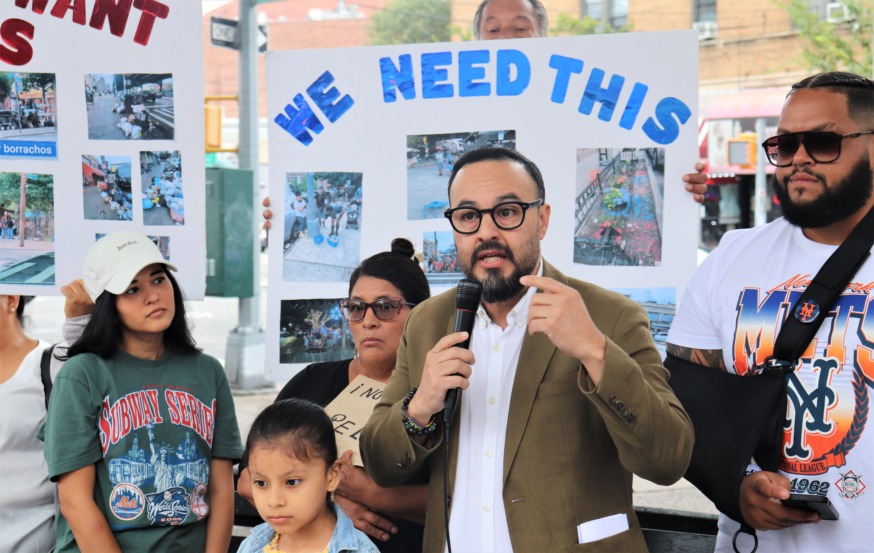 Rally for safe streets and no unauthorized vendors in Corona (Photo by Michael Dorgan)
Rally for safe streets and no unauthorized vendors in Corona (Photo by Michael Dorgan)
The group has found a lone partner in Councilman Franciso Moya who joined them at the rally and has been vocally opposed to the stance made by his Democratic colleagues, marking a noticeable split between the elected officials. Moya, who represents District 21 which covers Corona as well as East Elmhurst, Jackson Heights and LeFrak City, says that his constituents have had enough and want to see the neighborhood cleaned up.
“We deserve to have clean streets [and] safe streets for our community, what we’re seeing here is not that,” Moya said at last week’s rally.
Moya told the Queens/Jackson Heights Post in an exclusive interview recently that the plaza had become unsanitary and dangerous in large part due to the unauthorized vendors. He says that crime has also spiked at the plaza, with more than 75 felony arrests at the plaza so far this year, and that vendors had been operating late into the night attracting intoxicated and drug-taking people to the location. He also questioned the safety quality of the food some vendors have been selling.
Douglas Weidner, who volunteers at a local church in the area, said the plaza had become filthy with rats and “tons of garbage.”
“You come [to the plaza] late at night it’s the devil’s playground, you would see stuff you can’t believe,” Weidner said. “Because the vendors are here all night long people would come here [to] party and drink and then they have a place to eat.”
Weidner said the plaza was initially established as an open space for families, and not a marketplace. The city created Corona Plaza as a public space in 2018 for around $7 million by converting an old service road.
“I never see families using it because all the drunkies were here urinating in public, who wants to take their kids here?”
“[The unauthorized vendors] don’t throw the garbage away … they don’t have sanitation they just throw it and then in the morning it’s built up all over the plaza, it’s disgusting. But now since they stopped with the vendors it’s clean; it’s like a miracle.”
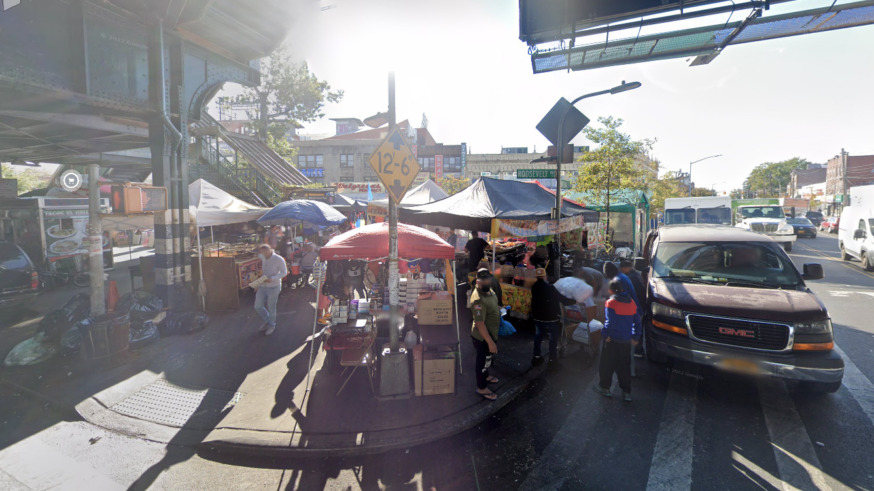
The plaza in September 2021 (Photo: Google Maps)
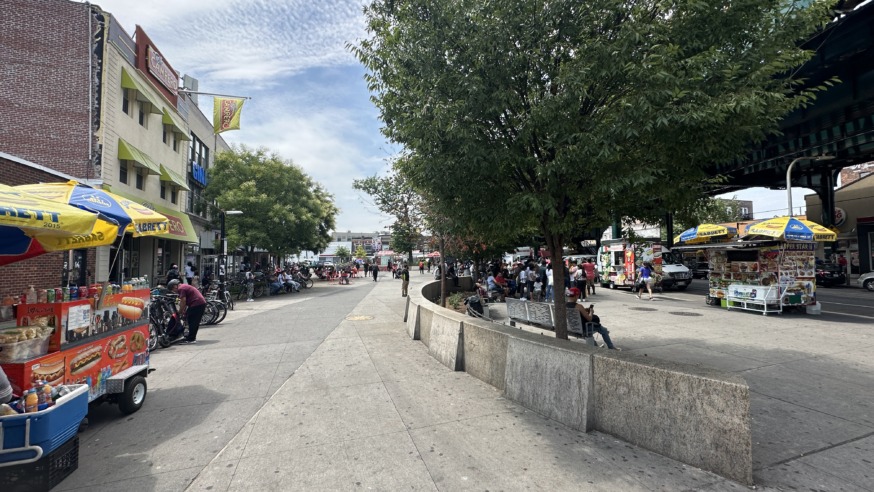
Corona Plaza on Monday, Aug. 7, after the sweep (Photo by Michael Dorgan)
Massiel Lugo, a local resident and mother of two, said she is afraid to walk the streets of Corona with her children given its hazardousness.
“My biggest concern is safety. I have a daughter going to high school and it’s too crowded. I have a son who has autism and if he were to run away from me, I would lose him because of the crowd,” Lugo said. “I am for the vendors, but there should be limits. They should be 10 feet apart. There should be specific times or specific designated spots. There should be a better way. I don’t even come to this area anymore. I have completely lost my community.”
Lugo started a petition around last week to rally support for clean and safe streets in Corona. The petition has generated around 1,200 signatures so far, she said.
The unauthorized vendors say they are acting in good faith despite not having permits, and that a minority of vendors are tarnishing them all with the same brush.
Alejandro H, who said he has been selling chalupas at the plaza for 25 years, pleaded for a resolution having been shut down during the sweep. He said he is married with three children and his family relies on him as the breadwinner.
“I’m not selling drugs,” he said. “We [are] selling food. I pay my taxes. We have a food license. I need to work, I don’t want [anything] free.”
Many of the vendors said that while some sellers had not been following the rules with regard to sanitation, the majority of them have been acting diligently.
Carina Kaufman-Gutierrez, the deputy director of the Street Vendor Project of the Urban Justice Center, said she recognized there had been problems at the plaza, but the vendors at the plaza had been working hard with city agencies like the Dept. of Sanitation — and with the mayor’s office of community affairs — to keep the area clean. The Queens Borough President’s office also created a task force to work with the vendors and the Street Vendor Project.
Kaufman-Gutierrez said the Corona Plaza Street Vendors Association was created because the vendors wanted to improve conditions at the plaza, with members of the group required to follow codes of practice in order to ensure the market functions effectively.
The collaboration resulted in a CitiBin being installed on Roosevelt Avenue where vendors can store their trash before collection. A CitiBin is a rodent-proof garbage enclosure for trash and recycling cans. They have also held meetings with the Dept. of Sanitation and with the mayor’s office of community affairs, she said.
“That’s an example of how [when] there’s an issue, we work together, and we solve it,” said Kaufman-Gutierrez, who was speaking at the plaza on Aug. 7, where the booted-out unauthorized vendors have been demonstrating every day since the DSNY sweep.
Kaufman-Gutierrez said that 81 workers were shut down during the sweep and are now out of work with no source of income.
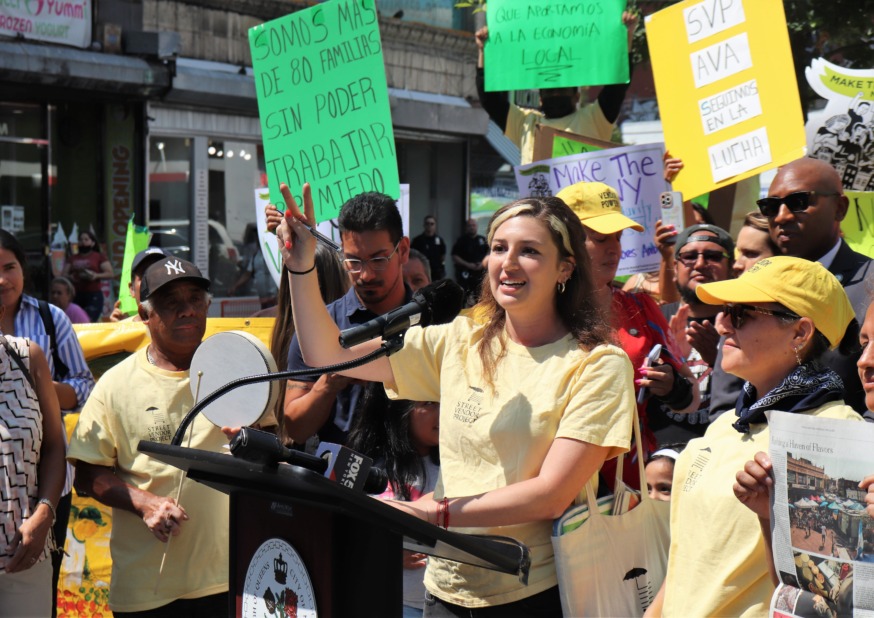
Kaufman-Gutierrez speaking at the rally (Photo by Michael Dorgan)

An authorized vendor at Corona Plaza (Photo by Michael Dorgan)
Kaufman-Gutierrez said the groups are trying to negotiate with the city to get permission for members to be able to operate at the location. The vendors also have a petition to support them being allowed back to operating at the plaza which they say has generated nearly 5,000 written signatures.
“We’re looking to work with Dept. of Transportation to obtain a permit so that there would be more regulation in the plaza, so that there would be an orderly way for vendors to come in, to set up and so that it would also be regulated with a market manager,” Kaufman-Gutierrez said. “The plaza is not just for the vendors, but vendors do play a vital role and so it’s imperative that we all work together.”
She called for all stakeholders to come together and resolve the issues at the plaza. Moya has said he understands the vendors’ plight in needing to make a living and said he has called for the city to install kiosks or regulated zones at the plaza.
The vendors want to see leniency and called for more permits to be issued but the reality is that gaining new permits seems to be more of a long-term fix given the high demand across the city. Kaufman-Gutierrez said that there are 10,000 applicants already on a waiting list, underlying the slim chances of the vendors netting one.
The City Council, including Moya, voted in 2021 for 445 new permits to be issued every year until 2032 which would increase the number of permits across the city by 4,000 to a total of 7,000. The rollout is understood to be behind schedule with only 100 issued so far, according to published reports.
Kaufman-Gutierrez said the vendors are doing everything else in their power to be able to operate correctly at the plaza.
For example, she said that all members of the Corona Plaza Street Vendors Association are required to have mobile food licenses issued by the Dept. of Health to sell food. Vendors are required to take a food safety course in order to apply for a mobile food license.
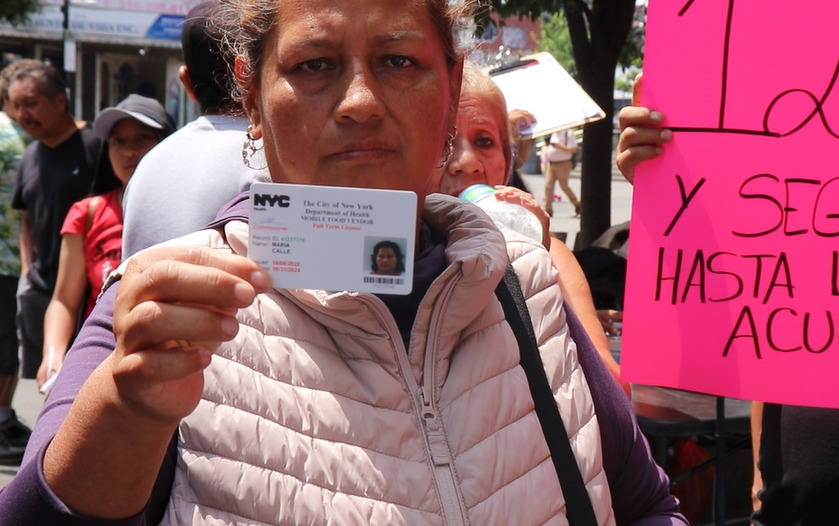
Maria Calle, a food vendor, shows her mobile food license (Photo by Michael Dorgan)
For instance, Maria Calle, a food vendor who is the vice-president of the Corona Plaza Street Vendors Association, showed the Queens/Jackson Heights Post her mobile food vendor license on video and said she has been renting a permit for a cart via the underground market at a cost of $25,000 every two years.
Calle, who was speaking through a translator, said many vendors cannot afford to rent a permit for a cart in the black market because of the lockdowns decimated their savings.
While some business owners say that the illegal vendors are competing against them, Calle says that they have played a big part in making the plaza a food hotspot that helps generate foot traffic for all businesses in the area. Calle said that the vendors contribute to the local economy and cultural life of the neighborhood.
One authorized female vendor who works at the plaza, agreed and said that she has seen a dip in business since the sweep.
Following the sweep, the plaza appears more orderly and spacious with a number of carts lined up along National Street and a few more scattered along Roosevelt Avenue as well as near 104th Street.
The question remains how long it will stay that way, and if members of the Corona Plaza Street Vendors Association will be granted their wishes to return.
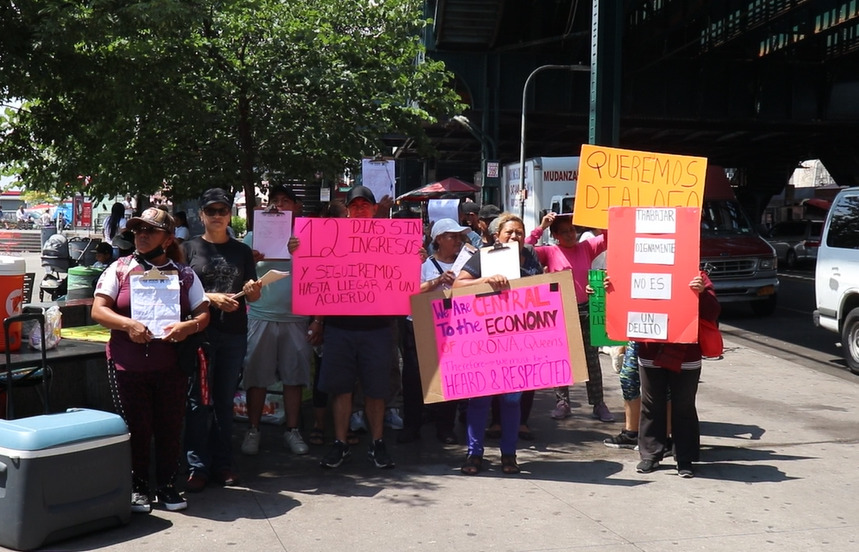
Vendors have been protesting at the plaza since the sweep (Photo by Michael Dorgan)
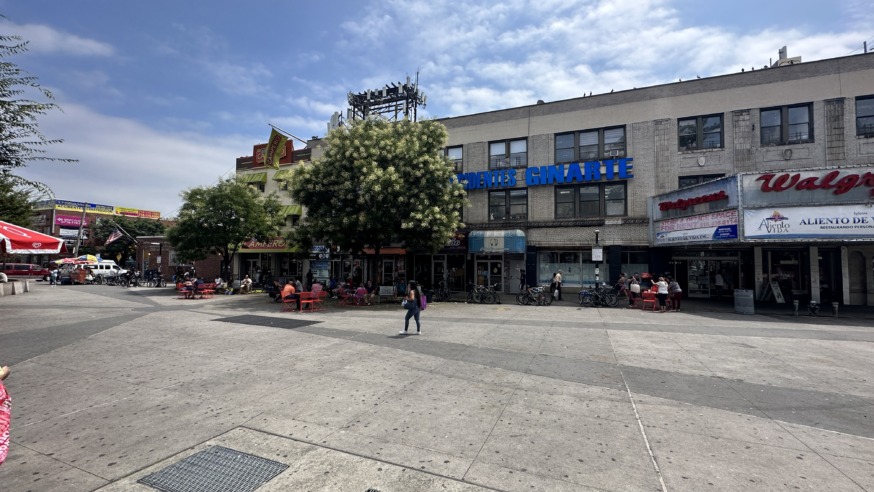
Corona Plaza on Monday, Aug. 7, after the sweep (Photo by Michael Dorgan)
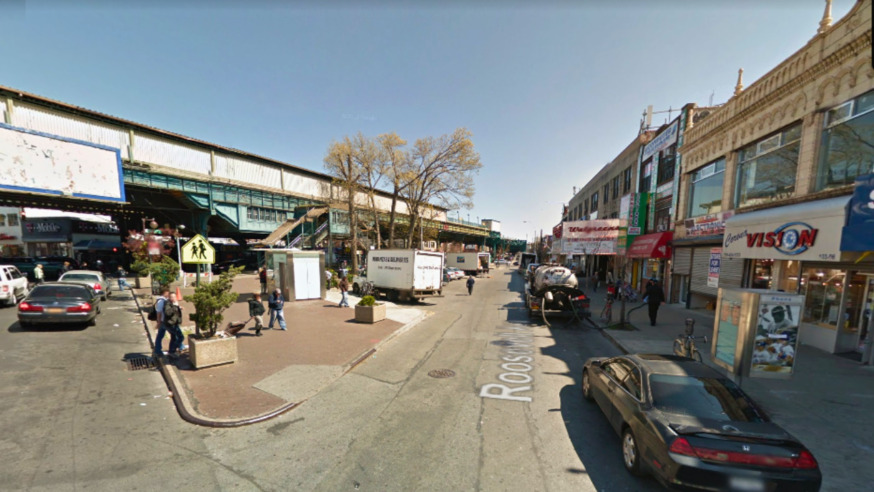
Corona Plaza in 2012 (Photo Google Maps)
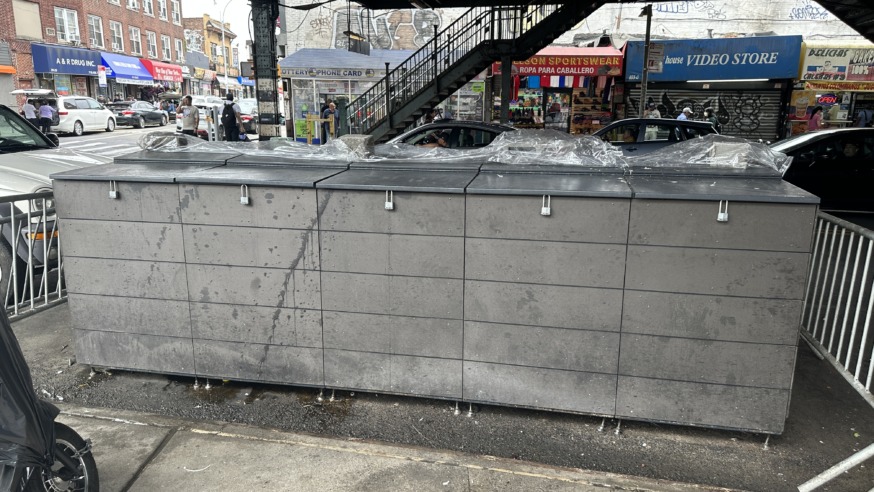
A rodent-proof garbage enclosure for trash and recycling cans has been installed at the plaza (Photo by Michael Dorgan)
5 Comments

Take a walk on Junction Blvd from 35ave to Roosevelt Ave you’d swear that you’re in some 3rd world (nay 5th 05th world) slum. Wall to wall illegals selling all manner of illegal crap. Ticket and fine them, destroy all their shit, and send them back.
Check the immigration
status of these illegal vendors and
The key thing is that sidewalks and plazas are public open space, not private commercial space. They are meant to be enjoyed by everyone not just the hundred or so illegal street vendors who have essentially stolen public property for their own use. We need public officials that will stand up to defend our public spaces from encroachment from private interests.
Most of our “public officials” are on the side of people who break the law. Nothing is being done about the bordellos that operate openly in Corona. Makes me think that somebody is on the take. I am sick of the illegality and the criminality.
Vote Red and let’s purge NYC